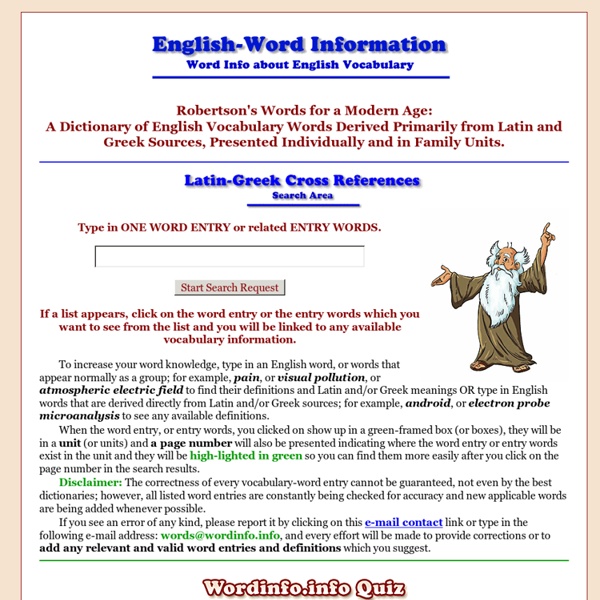Benjamin Franklin's Phonetic Alphabet
Benjamin Franklin took great interest in the promotion of spelling reform. While living in London in 1768 he wrote A Scheme for a new Alphabet and a Reformed Mode of Spelling in which he proposed a fairly accurate phonetic system for spelling English. The alphabet was published in 1779 in Franklin's Political, Miscellaneous, and Philosophical Pieces.
Word Formation :Processes.
As pointed out earlier, word-formation tries to explain the processes through which we can create new word forms. We’ve already seen some of these at work when we looked at morphemes and word classes, but now we’ll investigate them a little more closely, initially using exploratory methods again, rather than just looking at long lists of morphemes and listing their functions. ‘Strategies’ for Creating New Words
English: what you need to know about the language
english, english language, english lingusitics, english as a second language, english as a foreign language, english as the world What are the world's most widely spoken languages?In which countries is English the language spoken by the majority as a first language?In which countries is English an official language?
Improve Comprehension: A Word Game Using Root Words and Affixes
ReadWriteThink couldn't publish all of this great content without literacy experts to write and review for us. If you've got lessons plans, videos, activities, or other ideas you'd like to contribute, we'd love to hear from you. More Find the latest in professional publications, learn new techniques and strategies, and find out how you can connect with other literacy professionals. More
English
Open global navigation Cambridge English combines the experience and expertise of two world-leading departments of the University of Cambridge - Cambridge University Press and Cambridge English Language Assessment. Together, we deliver real-life English language learning, teaching and assessment through world-class research and a profound commitment to delivering educational value for the benefit of society as a whole. I'm a teacher Show me titles, courses and resources that I can use to teach my students and resources for my own professional development.
Echo-Word Data List
Data Here are some lists compiled by Nicholas Denyer, with the aid of contributions from Sidney Allen, Cathy Atherton, Susan Aufgang, Lynne Broughton, Graham Chinner, James Clackson, Sarah Clackson, Chris Decker, Neil Hopkinson, Jane Hughes, Denis Marrian, Jeremy Maule, Robert Wardy. JINGLE-JANGLES: (h)abdabs (the screaming) Ab Fab (Absolutely Fabulous) AC/DC (bisexual) Acey Deucey (version of backgammon) airy-fairy Ally Pally (Alexandra Palace) ambler gambler Andy Pandy (character on children's TV) argie-bargie ("ergo", as used in disputations) arsey darsey arsey-versey (head over heels) arty-farty arty-tarty Ashta-kashta (board game of Indian origin) baby boomer back pack Bali belly barmy army (England cricket supporters) BCBG ("bon chic, bon genre" = Sloaney) bee's knees better-notter big wig blackjack blue blood boho (Bohemian) bon ton boob tube boogie-woogie boo hoo Bow Bells bow wow boy toy (gun, fast car, etc.) brain drain bum boat bum chum (catamite; cf.
Synonyms for the 96 most commonly used words in English
Amazing — incredible, unbelievable, improbable, fabulous, wonderful, fantastic, astonishing, astounding, extraordinary Anger — enrage, infuriate, arouse, nettle, exasperate, inflame, madden Angry — mad, furious, enraged, excited, wrathful, indignant, exasperated, aroused, inflamed Answer — reply, respond, retort, acknowledge Ask– — question, inquire of, seek information from, put a question to, demand, request, expect, inquire, query, interrogate, examine, quiz
Rooting One's Way to Meaning
Lesson Question: How can the Visual Thesaurus help students discover the meanings of some ancient Greek and Latin roots? Applicable Grades:
Learn English Vocabulary, Idioms and Expressions
If you want to improve your English vocabulary, you need to try a variety of learning methods. On this page, you can find all kinds of vocabulary lessons. All vocabulary lessons include words 'in context', with clear, easily understood explanations to help students of English. More advanced learners can make their English more "colorful" by using more idioms and expressions.



